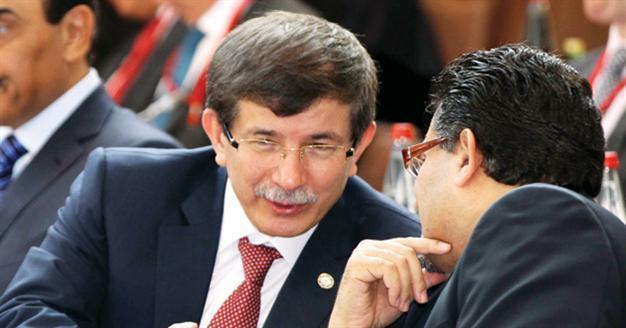Russia, China will pay price for Syria: Clinton
PARIS/MOSCOW

Turkish Foreign Minister Davutoğlu speaks with Tunisian counterpart Abdesalem (R) in Paris. Davutoğlu calls for more international pressure during the meeting. AA photo
Russia and China must “pay a price” for blocking U.N. sanctions that might press Syrian President Bashar al-Assad into stepping down, U.S. Secretary of State Hillary Clinton said July 6 in some of Washington’s strongest remarks yet on the crisis.“The only way that will change is if every nation represented here directly and urgently makes it clear that Russia and China will pay a price. They are holding up progress, blockading it. That is no longer tolerable,” Clinton told the Friends of the Syrian People conference in Paris on July 6.
Clinton’s remarks were followed immediately by a reaction from Russia, which was not present at the Paris meeting. “I categorically reject the formulation that Russia supports Bashar al-Assad’s regime in the situation that has developed in Syria,” said Deputy Foreign Minister Sergei Ryabkov in a statement quoted by Russian news agencies.
“What the Russian Federation is engaged in is not supporting specific politicians or political figures in Syria, but in work that we hope will help create the important dialogue between the authorities and the opposition. … The issue is not supporting specific political figures or leaders, but putting the process of regulating the crisis on a normal political basis.”
Russia criticize Clinton’s remarks as ‘inappropriate’
“The statement is inappropriate,” Deputy Foreign Minister Gennady Gatilov also told the Interfax news agency in an interview, saying the comment was not in line with the recent declaration signed in Geneva.
Turkish Foreign Minister Ahmet Davutoğlu, present at the conference, called for pressure on countries that support the Syrian administration and urged the necessity of establishing a transitional government for the future of the country.
French President François Hollande urged stiffer sanctions against al-Assad and more support for the rebels. “Bashar al-Assad must go ... It’s in the interest of Syria, of its neighbors and everyone who wants peace in the region.” British Foreign Secretary William Hague told the conference those countries that failed to impose sanctions were allowing al-Assad’s forces to go on killing.
Clinton and Hague were among the 50 foreign ministers and delegates meeting in Paris. But Russia and China stayed away from a meeting they said was one-sided.
In its final statement on July 6, the Friends of the Syrian People called for a U.N. Security Council resolution backed by sanctions.
The meeting was seeking a resolution under the U.N. charter’s Chapter 7, including the threat of sanctions and diplomatic action in line with Article 41, which explicitly does not allow for use of armed force. Participants at the Paris meeting called on the U.N. Security Council to “adopt, under the United Nations Charter’s Chapter 7, a resolution that reaffirms envoy Kofi Annan’s six-point plan,” the final statement said.
















